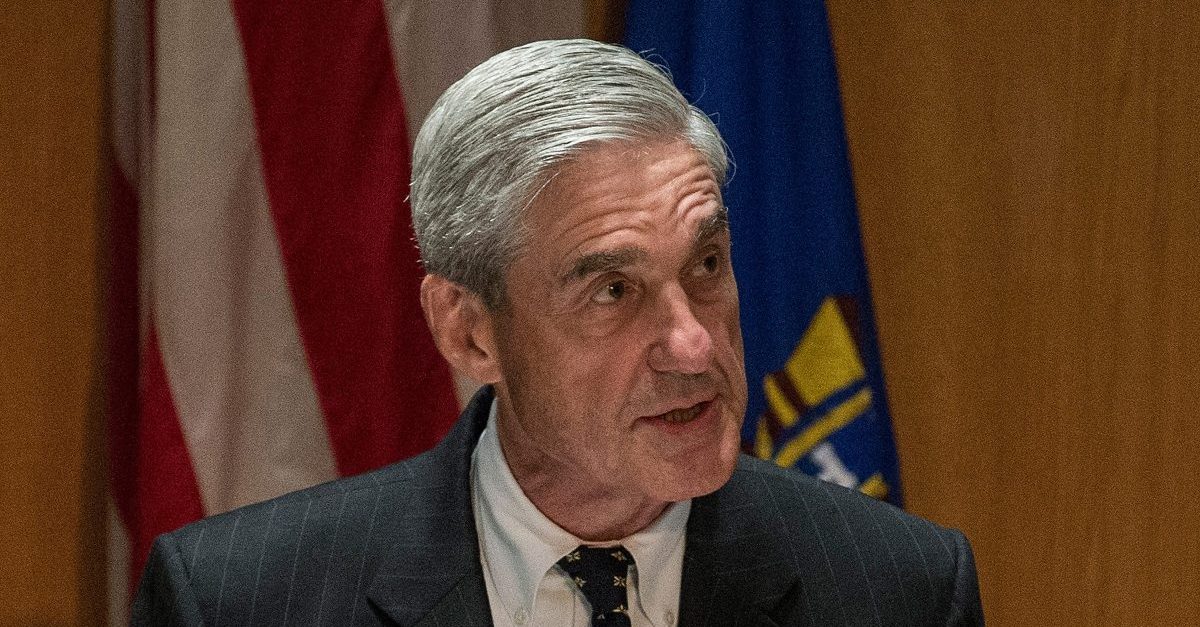
One rallying cry behind supporters of President Donald Trump when it comes to the Russia investigation is that even if there is evidence that the Trump campaign colluded with Russia, collusion itself is not a crime unless it was done through actions that were independently illegal. That means that if, for example, the Trump campaign was involved in the hacking of Democratic National Committee emails, that would be a problem because the hacking would be the illegal act. Merely talking to Russia or coordinating certain legal activities would not be a problem, the argument goes, because “collusion” itself is not illegal.
That last part may be true, but a recent opinion in case brought by Special Counsel Robert Mueller points out that there are situations where collusion in the form of even legal acts could still result in a criminal charge. Specifically, it’s the statute of Conspiracy to Defraud the United States.
“This court ruling should drive another nail in the coffin of the argument that collusion is not a crime. It clearly can be, and the crime is conspiracy – even if no other independent criminal violations are identified,” wrote Randall Eliason, a former federal prosecutor and lecturer at George Washington Law School. “Mueller’s use of that theory in his Russian social media indictment is a textbook example of a 371 conspiracy to defraud the U.S., and that theory has now been validated by the trial judge’s ruling.”
As U.S. District Judge Dabney Friedrich explained in her opinion last week, there are two ways to violate 18 U.S.C. 371. One can either “conspire … to commit any offense against the United States,” which is conspiracy in the traditional sense, or one can conspire “to defraud the United States, or any agency thereof in any manner or for any purpose[.]”
For either method of conspiracy, one must have an agreement with another party to carry out the conspiracy, an then at least one party must “do any act to effect the object of the conspiracy.”
The case was involving Concord Management, a company which Mueller indicted for it’s alleged involvement in an elaborate scheme to influence American voters by using fake identities to post messages on social media, having Russia operatives on the ground in the United States carrying out activities such as staging grassroots protests, and spending money to carry out the operations.
Where it gets tricky, and where Concord Management challenged Mueller’s case, is that the courts have ruled that when defrauding the United States, that doesn’t just mean that one tried to commit fraud against the U.S. It also means, “any conspiracy for the purpose of impairing, obstructing or defeating the lawful function of any department of Government.”
That means that if two or more parties conspire to get in the federal government’s way of doing its job, even through activities that are otherwise lawful, that’s enough to trigger the statute.
In other words, collusion itself can be a crime if it’s for the purpose of pulling a fast one on a department of the federal government.
Concord Management challenged this idea, saying that there cannot be a conspiracy conviction “based strictly on lawful conduct” even if it was “concealed from the government.” The judge wasn’t convinced.
“A defraud-clause conspiracy need not, however, allege an agreement to violate some [separate] statutory or regulatory provision,” Judge Friedrich wrote, citing previous cases that support this.
As a result, she said, this trumps Concord Management’s claim Mueller didn’t have enough to charge them with more specific violations.
Federal law, the indictment says, “bans foreign nationals from making certain expenditures or financial disbursements for the purpose of influencing federal elections” and “bars agents of any foreign entity from engaging in political activities within the United States without first registering with the Attorney General.” Just because Mueller may not have enough to prove that Concord Management had the requisite intent to violate the statutes that ban such behavior, there can still be enough to show that their “course of conduct” was enough to trigger the defraud clause of the conspiracy statute.
So what does this mean for the Trump campaign? Well, it means for starters that if Mueller uncovers evidence that they were involved in Concord Management’s operation, the defraud clause could apply to them as well. More importantly, however, it means that if campaign officials colluded with Russia in a way that was meant to impair, obstruct, or defeat the function of a government agency, they could face charges even if they those acts on their own were otherwise legal.
Ronn Blitzer is the Senior Legal Editor of Law&Crime and a former New York City prosecutor. Follow him on Twitter @RonnBlitzer.
Concord Management Opinion by Law&Crime on Scribd
[Image via Andrew Burton/Getty Images]